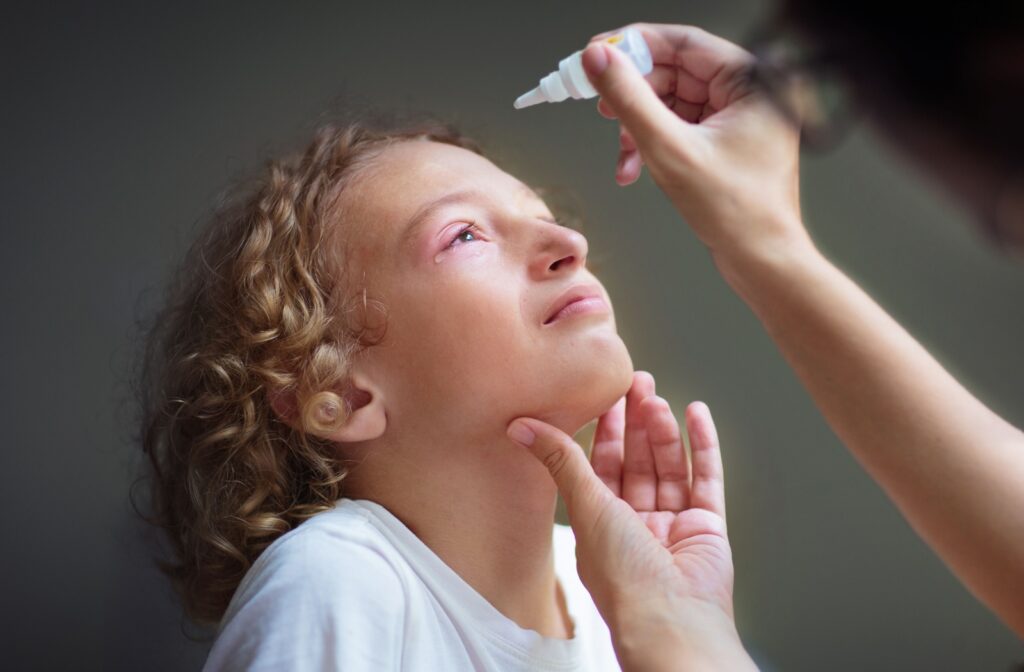Conjunctivitis, commonly known as “pink eye,” is one of those conditions that many of us have heard of. But how serious is it, and is it contagious?
Infectious conjunctivitis—including bacterial conjunctivitis and viral conjunctivitis—is contagious. However, allergic and chemical conjunctivitis are not contagious. You can take steps to prevent the spread of conjunctivitis.
Because conjunctivitis and other eye conditions may look similar, it’s important to get an eye doctor’s advice. Visit your optometrist if you’re concerned about conjunctivitis or other eye diseases.
What is Conjunctivitis?
Conjunctivitis is also known as “pink eye” and it refers to inflammation of the conjunctiva. The conjunctiva is a thin and clear membrane that covers the white part of your eye (also known as the sclera). Conjunctivitis is most commonly seen in children, but anyone of any age can be affected. Sometimes, conjunctivitis can lead to serious complications if not treated promptly.
Types of Conjunctivitis
Some types of conjunctivitis are contagious. It all depends on the cause.
Bacterial Conjunctivitis
Bacterial conjunctivitis spreads through direct contact with contaminated surfaces or objects, such as unclean hands or makeup. It’s contagious, but antibiotics can help speed recovery.
Viral Conjunctivitis
Often caused by the same viruses behind the common cold, viral conjunctivitis is highly contagious. It spreads easily through sneezing and coughing and can happen after an upper respiratory infection. The virus can enter the body through mucous membranes, which include the eyes, nose, throat, and lungs.
Both bacterial and viral conjunctivitis can spread from one eye to another.
Allergic Conjunctivitis
This type of conjunctivitis is triggered by allergens like pollen, dust, or pet dander. It can happen seasonally or year-round, but is not contagious.
Chemical Conjunctivitis
Exposure to irritants like chlorine in a swimming pool, air pollution, or more dangerous substances can cause chemical conjunctivitis. Chemical exposures may require immediate medical care, but chemical conjunctivitis is not contagious.
Symptoms of Conjunctivitis
Symptoms of conjunctivitis or pink eye can include:
- Pink or red in the white parts (sclera) of the eye
- Itching and/or burning
- Swollen eyelids
- Light sensitivity
- Discharge—can be watery, yellow, stringy, or mucus-like
If you experience these symptoms, reach out to your eye doctor.
A red or pink eye can be the symptom of a more serious eye disease that can be dangerous to your vision. Eye discolouration, light sensitivity, and pain are symptoms that should be looked at right away.
How Conjunctivitis Is Treated

The way conjunctivitis is treated depends on the cause and type of conjunctivitis. Bacterial conjunctivitis can be managed with prescription antibiotic eye drops or ointments.
Antibiotics don’t work on viral conjunctivitis, but it usually clears up on its own within 1 to 3 weeks. You can make yourself feel more comfortable by applying a cold compress to your infected eye(s)—just be careful not to share the washcloth with others or use it on your uninfected eye.
Allergic conjunctivitis can be treated with antihistamines, which can even prevent the allergic reaction from beginning in some cases.
Treating chemical conjunctivitis depends on the chemical exposure. Flush your eyes with clean water for at least 15 minutes, even if they feel okay. Some chemical exposures require immediate medical care. Individuals in Saskatchewan can call the Poison Information Centre 24 hours a day year-round for advice.
Is Conjunctivitis Contagious?
Bacterial and viral conjunctivitis are contagious and can easily spread from one person to another. The disease can spread through direct contact with individuals or contaminated objects, touching your eye after coming into contact with the bacteria or virus, or through aerosols when someone coughs or sneezes.
You can take steps to prevent the spread of conjunctivitis or to avoid getting it in the first place. These methods work particularly well for viral conjunctivitis:
- Frequently wash your hands with soap and warm water
- Avoid touching or rubbing your eyes
- Don’t share personal items like towels, makeup, or makeup brushes; dispose of these items if they’ve been used by an infected person
- Never share contact lens cases
- Regularly disinfect frequently touched surfaces like door handles, faucets, and phones
- If one eye is infected, don’t use the same eye dropper or cloth on the other eye
- Wash out the discharge from the infected eye multiple times a day with a disposable tissue
- Wash your hands after using eye droppers or ointments on an infected eye
- Launder bed linens, towels, and other personal items used by the infected person with hot water and detergent
- Children with viral conjunctivitis should stay home
Conjunctivitis Care at Northern Lights Eyecare
Clear and comfortable vision is an important part of overall health and well-being. If you have questions about your eye health, Northern Lights Eyecare is here to discuss your concerns. Serving the Prince Albert area, we offer comprehensive eye exams to identify and treat a wide range of eye conditions.Our team strives to provide every client with a comprehensive and personalized experience, and we want you to feel heard.
Book an appointment with us today.


